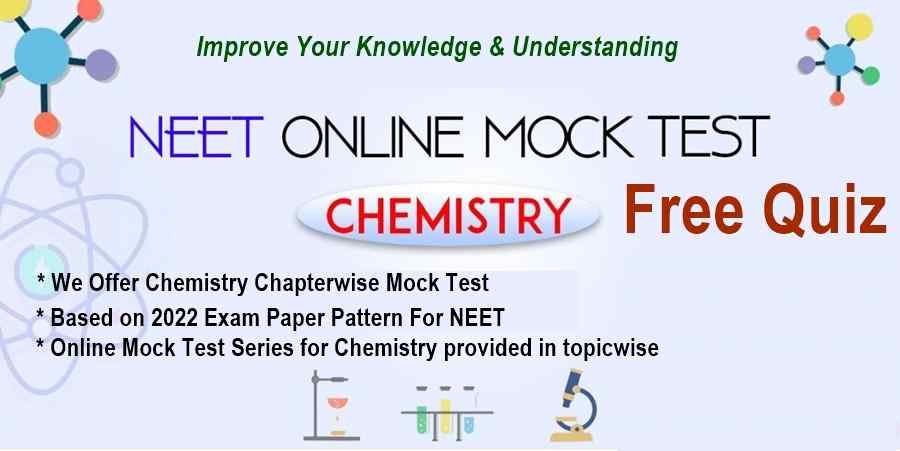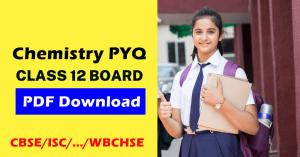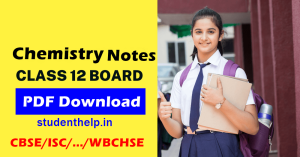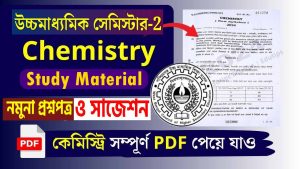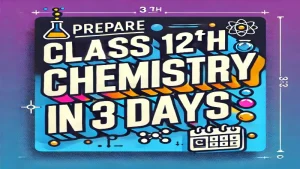100+ NEET Chemistry Mock Test: Free Practice Online MCQ Series 2025. You can find chapter-wise Chemistry mock tests for the NEET exam on this page. We offer NEET Chemistry Chapter-wise Mock Test so that you get used to the Exam Paper Pattern and analyze your preparation level.
We offer Chapter and topic wise NEET Chemistry Online Mock Test so that you get used to the Exam Paper Pattern and analyze your preparation level. Students who wish to got rank in JEE Main & NEET Exams should start preparing seriously as NEET is a Top medical entrance exam. You can exercise the Online Mock Test Series for Chemistry provided in chapter and topic wise format. Chemistry Online Mock Test Series for NEET, Chemistry Quiz, Online Chemistry Practice and Preparation Tests.

NEET Chemistry Mock Test Online 2025
NEET Online Mock Tests are designed by experienced teachers keeping many things in mind. This is very important for those who are studying for NETT. By practising the following questions, you will understand the type of questions that come in the NEET exam. How many minutes it takes to answer each question will also be understood. It is very easy to understand where each chapter comes from and what kind of questions it comes from.
Doing such things will enable the students to score good marks in the NEET 2024 Examination.
NEET Chemistry Mock Test
NEET Chemistry Mock Test enables you to keep your eyes on your exam preparations. It is loaded with different types of questions that help the candidates to assess their preparation. Solving such papers frequently and analyzing the scores achieved in the Mock test will determine whether your Preparations for the exam is on the right path or not.
| Unit | Unit Name |
| Unit-1 | SOME BASIC CONCEPTS IN CHEMISTRY |
| Unit-2 | ATOMIC STRUCTURE |
| Unit-3 | CHEMICAL BONDINC AND MOLECULAR STRUCTURE |
| Unit-4 | CHEMICAL THERMODYNAMICS |
| Unit-5 | SOLUTIONS |
| Unit-6 | EQUILIBRIUM |
| Unit-7 | REDOX REACTIONS AI{D ELECTROCHEMISTRY |
| Unit-8 | CHEMICAL KINETICS |
| Unit-9 | CLASSITICATION OF ELEMENTS AND PERIODICITY IN PROPERTIES |
| Unit-10 | P- BLOCK ELEMENTS Group -13 to Group 18 Elements |
| Unit-11 | d – and f- BLOCK ELEMENTS |
| Unit-12 | CO-ORDINATION COMPOUNDS |
| Unit-13 | PURIFICATION AND CHARACTERISATION OF ORGANIC COMPOIJNDS |
| Unit-14 | SOME BASIC PRINCIPLES OF ORGANIC CHEMISTRY |
| Unit-15 | HYDROCARBONS |
| Unit-16 | ORGANIC COMPOUNDS CONTAINING HALOGENS |
| Unit-17 | ORGANIC COMPOUNDS CONTAINING OXYGEN |
| Unit-18 | ORGANIC COMPOUNDS CONTAINING NITROGEN |
| Unit-19 | BIOMOLECULES |
| Unit-20 | PRINCIPLES RELATED TO PRACTICAL, CHEMISTRY |
Chemistry Chapter-wise Weightage in NEET 2024 Paper
Chemistry Chapter-wise Weightage in NEET 2024 Paper breaks down the Chemistry paper into its core chapters (organic, inorganic, and physical chemistry). It explores the frequency and difficulty of questions from each area, helping future aspirants to prioritise topics that need more comprehensive coverage based on their weightage and complexity.
| Physics Chapter-wise Weightage in NEET 2024 Paper | ||
|---|---|---|
| Class | Chapter Name | No. of Questions |
| 12th | Electrochemistry | 2 |
| 11th | Redox Reactions | 1 |
| 11th | Chemical Bonding and Molecular Structure | 3 |
| 12th | Aldehydes, Ketones and Carboxylic Acids | 3 |
| 11th | Some Basic Concepts of Chemistry | 3 |
| 12th | The d and f-Block Elements | 4 |
| 11th | Thermodynamics | 3 |
| 12th | Chemical Kinetics | 3 |
| 11th | Organic Chemistry: Some Basic Principles and Techniques | 4 |
| 11th | Classification of Elements and Periodicity in Properties | 2 |
| 12th | Alcohols, Phenols and Ethers | 2 |
| 12th | Coordination Compounds | 3 |
| 12th | The p-Block Elements (XII) | 2 |
| 11th | Structure of Atom | 2 |
| 12th | Biomolecules | 1 |
| 11th | Equilibrium | 3 |
| 11th | Hydrocarbons | 2 |
| 12th | Haloalkanes and Haloarenes | 2 |
| 12th | Amines | 2 |
| 12th | Solutions | 2 |
| 12th | Principles of Qualitative Analysis | 1 |
| Grand Total | 50 | |
Tips to Cover NEET Syllabus 2025
To cover the NEET syllabus 2025 with full understanding requires a structured approach and consistent effort. Here are some tips to effectively cover the syllabus:
- Create a Study Plan
- Use High-Quality Study Materials
- Practice Regularly
- Focus on Weak Areas
- Revise Frequently
- Join a Study Group
NEET Syllabus 2025 for Chemistry
The chemistry syllabus for NEET 2025 is split into organic, inorganic, and physical chemistry. It covers chemical bonding, reaction mechanisms, and the properties of elements and compounds. A strategic approach to mastering theoretical concepts and practical applications will be crucial for aspirants aiming for high scores.
| Class 11 Physical Chemistry | |
|---|---|
| Unit | Topics Covered |
| UNIT 1: Some Basic Concepts of Chemistry | Matter and its nature, Dalton’s atomic theory, laws of chemical combination, concept of elements, atoms, and molecules, atomic and molecular masses, mole concept and molar mass, percentage composition, empirical and molecular formulae, chemical reactions, stoichiometry |
| UNIT 2: Structure of Atom | Discovery of electron, proton, and neutron, atomic number, isotopes and isobars, Thompson’s model and its limitations, Rutherford’s model and its limitations, Bohr’s model and its limitations, concept of shells and subshells, dual nature of matter and light, de Broglie’s relationship, Heisenberg uncertainty principle, the concept of orbitals, quantum numbers, shapes of s, p and d orbitals, rules for filling electrons in orbitals – Aufbau principle, Pauli exclusion principle, Hund’s rule, electronic configuration of atoms, stability of half-filled and filled orbitals |
| UNIT 3: Classification of Elements and Periodicity in Properties | Significance of classification, development of the periodic table, modern periodic law and the present form of the periodic table, periodic trends in properties of elements – atomic radii, ionic radii, ionization enthalpy, electron gain enthalpy, electronegativity, valence |
| Class 12 Physical Chemistry | |
| UNIT 4: Chemical Bonding and Molecular Structure | Valence electrons, ionic bond, covalent bond, bond parameters, Lewis structure, the polar character of covalent bond, the covalent character of ionic bond, valence bond theory, resonance, the geometry of covalent molecules, VSEPR theory, the concept of hybridization involving s, p, and d orbitals, molecular orbital theory of homonuclear diatomic molecules (qualitative idea only), hydrogen bond |
| UNIT 5: States of Matter: Gases and Liquids | Three states of matter, intermolecular interactions, types of bonding, melting and boiling points, role of gas laws in elucidating the concept of the molecule, Boyle’s law, Charle’s law, Gay Lussac’s law, Avogadro’s law, ideal behavior, empirical derivation of gas equation, Avogadro number, ideal gas equation, kinetic energy and molecular speeds (elementary idea), deviation from ideal behavior, liquefaction of gases, critical temperature, Liquid State – Vapour pressure, viscosity, and surface tension (qualitative idea only, no mathematical derivations) |
| UNIT 6: Thermodynamics | Concepts of system, types of systems, surroundings, work, heat, energy, extensive and intensive properties, state functions, the first law of thermodynamics – internal energy and enthalpy, heat capacity and specific heat, measurement of ΔU and ΔH, Hess’s law of constant heat summation, enthalpy of bond dissociation, combustion, formation, atomization, sublimation, phase transition, ionization, solution, and dilution, the introduction of entropy as a state function, the second law of thermodynamics, Gibbs energy change for spontaneous and non-spontaneous process, criteria for equilibrium, the third law of thermodynamics – a brief introduction |
| UNIT 7: Equilibrium | Equilibrium in physical and chemical processes, dynamic nature of equilibrium, law of mass action, equilibrium constant, factors affecting equilibrium – Le Chatelier’s principle, ionic equilibrium – ionization of acids and bases, strong and weak electrolytes, degree of ionization, ionization of polybasic acids, acid strength, concept of pH., Hydrolysis of salts (elementary idea), buffer solutions, Henderson equation, solubility product, common ion effect (with illustrative examples) |
| UNIT 8: Redox Reactions | Concept of oxidation and reduction, redox reactions, oxidation number, balancing redox reactions in terms of loss and gain of electron and change in oxidation numbers, applications of redox reactions |
| Class 11 Inorganic Chemistry | |
|---|---|
| Unit | Topics Covered |
| UNIT 9: Classification of Elements and Periodicity in Properties | Modern periodic law and the current form of the periodic table; s, p, d, and f-block elements; Periodic trends in properties such as atomic and ionic radii, ionization enthalpy, electron gain enthalpy, valence, oxidation states, and chemical reactivity. |
| Class 12 Inorganic Chemistry | |
| UNIT 10: P-Block Elements | General Introduction; Electronic configuration; General trends in physical and chemical properties; Unique behavior of the first element of each group; Group 13 to Group 18 elements. |
| UNIT 11: d- and f-Block Elements | General introduction, electronic configurations, occurrence, and characteristics of transition elements; General trends in properties such as physical properties, ionization enthalpy, oxidation states, atomic radii, color, catalytic behavior, magnetic properties, complex formation; Preparation, properties, and uses of compounds like K₂Cr₂O₇ and KMnO₄; Lanthanoids and actinoids, including electronic configurations, oxidation states, and lanthanoid contraction. |
| UNIT 12: Coordination Compounds | Introduction to coordination compounds; Werner’s theory; Ligands, coordination number, denticity, chelation; IUPAC nomenclature of mononuclear coordination compounds; Isomerism; Bonding: Valence bond approach and basic ideas of Crystal field theory; Color and magnetic properties; Importance of coordination compounds in qualitative analysis, extraction of metals, and in biological systems. |
| NEET 2025 Syllabus for Class 11 Organic Chemistry | |
|---|---|
| Unit | Topics Covered |
| UNIT 13: Purification and Characterisation of Organic Compounds | Purification methods (crystallization, sublimation, chromatography, distillation, differential extraction); qualitative and quantitative analysis including detection of elements (N, S, P, halogens) and calculations of empirical and molecular formulas. |
| UNIT 14: Some Basic Principles of Organic Chemistry | Tetra-valency of carbon, hybridization, classification based on functional groups, isomerism, nomenclature, types of organic reactions (substitution, addition, elimination, rearrangement), electronic effects (inductive, electromeric, resonance, hyperconjugation). |
| UNIT 15: Hydrocarbons | Classification and isomerism; Alkanes, Alkenes, and Alkynes – structure, properties, and reactions; Aromatic hydrocarbons – structure, aromaticity, electrophilic substitution reactions. |
| Class 12 Organic Chemistry | |
| UNIT 16: Organic Compounds Containing Halogens | Preparation, properties, and reactions of haloalkanes and haloarenes; environmental effects of compounds like chloroform and DDT. |
| UNIT 17: Organic Compounds Containing Oxygen | Properties and reactions of alcohols, phenols, ethers, aldehydes, ketones, carboxylic acids; important organic reactions such as nucleophilic addition and condensation. |
| UNIT 18: Organic Compounds Containing Nitrogen | Amines and diazonium salts – preparation, properties, reactions, and uses; importance in synthetic organic chemistry. |
| UNIT 19: Biomolecules | Classification and functions of carbohydrates, proteins, vitamins, nucleic acids; structure and function of biomolecules in biological processes. |
| UNIT 20: Principles Related to Practical Chemistry | Detection of elements and functional groups in organic compounds; principles involved in the preparation of specific inorganic and organic compounds; qualitative and quantitative analysis including titrimetric and gravimetric analysis. |
Read More: NEET Syllabus
NTA NEET Chemistry Exam Mock Test Details
| NEET Chemistry Exam | Details |
|---|---|
| NEET Chemistry Exam Conducting Body | National Testing Agency (NTA) |
| Exam Name | National Eligibility cum Entrance Test |
| NEET Exam Subject | Chemistry |
| Total Objective type Questions in NEET Chemistry Paper | 45 Multiple Choice Questions (MCQs). |
| NEET (Chemistry) Marking Scheme | Marks per Correct Answer = +4 Marks.Marks per Incorrect Answer = -1 Marks. |
| Total Marks | 180 Marks |
| NEET Chemistry Test Duration | 45 Minutes |
NEET Chemistry Mock Test PDF Download
There are some students who, instead of online NEET Chemistry mock tests, feel comfortable doing offline NEET Chemistry MCQ practice, for them we have provided offline MCQ practice PDFs. They can take the test by downloading and printing out as they wish. Students can check the correctness of the answer sheets as needed with our answer sheets.
| PDF Download of NEET Chemistry Mock Test-1 |
| PDF Download of NEET Chemistry Mock Test-2 |
| PDF Download of NEET Chemistry Mock Test-3 |
| PDF Download of NEET Chemistry Mock Test-4 |
| PDF Download of NEET Chemistry Mock Test-5 |
| PDF Download of NEET Chemistry Mock Test-6 |
We believe that the knowledge shared above regarding the NEET Chemistry Chapter Wise Mock Test has been useful to you to an extent. If you’ve got any doubts be happy to contact us via the comment section and that we are here to assist you out at the earliest. Bookmark our site for more latest information on NEET Previous Year Question Papers, NEET Syllabus, Notes and Books needed during your preparation.
studenthelp.in have largest best collection of mcq for practice and its free forever .We believes “The more you exercise the better you’ll be, the harder you train the great in you they’ll see.” chemistry.in will go out of its way to make these study material the best on the internet. I hope you find it helpful. Don’t forget to share. Stay connected for more.
PLEASE LIKE OUR FACEBOOK PAGE / Follow on instagram and Free to share our post to your Friends.
We wish the knowledge shared above regarding Chemistry MCQ Online Mock Test MCQ Questions for GATE, CSIR NET, IIT-JAM, SET, SSC, WBSSC, WBSLST, BCS, B.Sc, M.Sc, NEET, JEE and Class 12 with Answers has been useful to you. If you still have any queries left answered feel free to ask us through the comment section.
FAQs on NEET Chemistry Online Mock Test
1. Which is the best online test series containing chapter-wise tests for preparation for the NEET Chemistry?
ChemistryUP.in have got the best online Mock test series for NEET and JEE Main that can aid your preparation for clearing the NEET Chemistry and you can practice them to have a deeper understanding of concepts.
2. From Where can I get Mock Test Papers for NEET in the form of PDF?
Candidates can utilize the quick links available on our page to access the NEET Mock Test Papers in PDF Format. Begin your NEET and JEE Main preparation with the free handy tools and score good in the NEET Entrance Exam thorough NTA.
